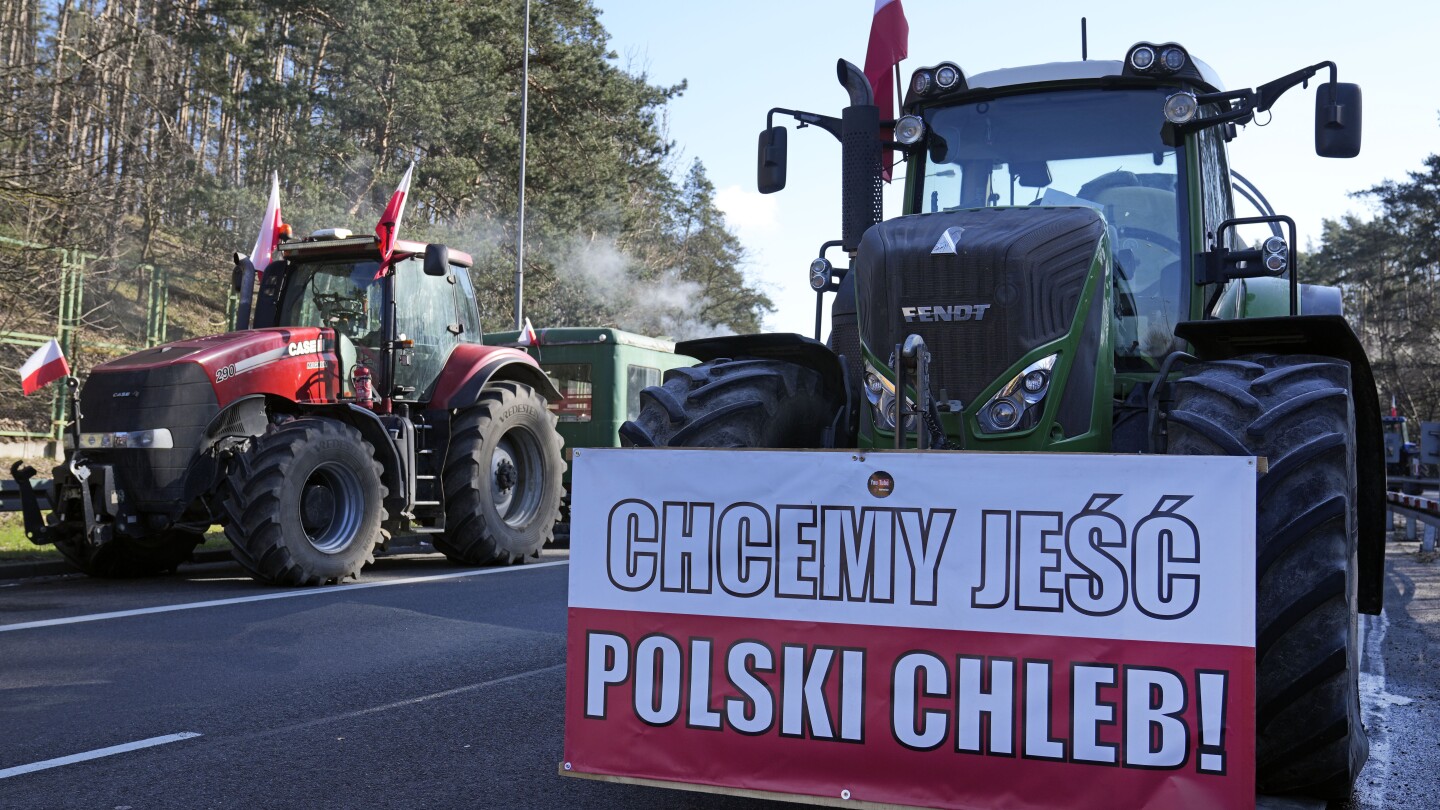CYWINY WOJSKIE, Poland (AP) — Piotr Korycki picks up a handful of wheat and watches as the yellow grains run through his fingers.
All around him, grain is piled high in a warehouse on his farm north of the Polish capital: hundreds of tons of wheat, rye and corn left over from last year’s harvest that he is unable to sell for a profit.
With a new harvest on the horizon, he feels pressure to sell what he has to prevent it from going bad.
“The situation on our markets is really very, very tough,” Korycki said. “And if nothing changes, in a year or two it could become critical.”
Korycki’s frustrations have pushed him to help organize protests that have been taking place in Poland for the past three months, part of protests by farmers across Europe. The latest in Poland is expected on Wednesday.
His yard is filled with bales of hay and modern farm equipment, evidence of the changes that came to agriculture in Poland since the country joined the European Union nearly 20 years ago. The family farms 200 hectares (nearly 500 acres) of wheat, rye, corn and sugar beets.
The 34-year-old, a farmer like his father and grandfather, says his business has been badly destabilized by Russia’s war against Ukraine, a result of the EU deciding to allow free trade with Ukraine after the war started.
But the disruption of Ukrainian exports via the Black Sea led to a massive flow of grain across Poland’s borders with Ukraine, driving down prices for food products while inflation has caused production costs and interest rates on loans to rise.
Korycki didn’t feel the pain for the first year of the war. Early on, the price for grain rose, but then fell dramatically. While he managed to sell part of last year’s harvest, he still has 300 tons of grain and isn’t sure what to do with it. The surplus represents a loss of 100,000 zlotys ($25,000), which he calls “very large.”
In the past, he would have taken the grain to the Baltic Sea coast to sell to buyers who export it abroad by ship. But with the price collapse, what he would get would not cover transport costs. He expects the best he can do is sell it closer to home as animal feed at a loss.
“It’s going to be critical because land prices are rising, prices of commodities for production remain at a high level and prices of the final product are simply going down constantly,” he said.
Korycki is also angry because he says the EU seems to have no idea of what to do with the grain, “where to export it, on what terms, for what money, so this problem will only get worse.”
Poland’s Prime Minister Donald Tusk acknowledges that the problem is real, and has been seeking relief for farmers in Brussels, where his voice carries weight after serving as president of the European Council from 2014-2019.
Tusk has said there are well over 20 million surplus tons of grain in storage in Europe, with 9 million tons in Poland alone.
“And the summer harvest hasn’t started yet,” Tusk said in late February. “We do not yet have the infrastructure that would allow this grain to be exported further.”
Adding to the anger of farmers across Europe are EU plans to fight climate change with policies dubbed the Green Deal, which they say will create more administrative work and worsen financial burdens.
The calls of Europe’s farmers have grown increasingly strident even though the European Commission has relented to their pressure by rolling back some environmental requirements — despite warnings by scientists that agricultural production must become more environmentally sustainable in a period of climate change.
Paulina Sobiesiak-Penszko, a sociologist and agricultural expert at the Institute of Public Affairs in Warsaw, said the protests have become more radical, and asserted that they are being exploited by pro-Russian groups to drive an anti-Ukraine agenda.
What is being lost, she argued, is the necessity of addressing the climate crisis, which requires new agricultural policies, and the needs of consumers, who among other things would benefit from less pesticide use in farming.
“This voice of the consumers is not heard at all in the debate,” she said.
Korycki, as part of his work with a union representing farmers’ interests, is encouraging others to vote in the June election for the European Parliament.
“All the problems start right there in the European Parliament,” he said. “We will try to make society aware so that the votes they cast will be well-thought-out and rational.”
He believes the most rational choice is Confederation, a right-wing party that is anti-EU and has been one of the loudest voices in Poland against Ukrainian imports.
Korycki said Confederation is the only party that seems to have answers to farmers’ problems. He acknowledges that the EU has spurred development in the agricultural sector but believes life overall has not improved for his family.
“Nothing comes for free,” he said of the EU. “What they gave us, they are now taking away.”
Sobiesiak-Penszko believes that the rising frustration of farmers indicates that policy makers did not make their case well enough to farmers during the years they were planning changes.
“Farmers are not prepared for changes,” she said. “They don’t understand the purpose and sense of the green transformation.”
Korycki finds himself hoping that the war in Ukraine will end soon so that the situation can stabilize for him and fellow farmers across this central European nation of 38 million people.
Beyond that, he doesn’t really have a plan. He has taken loans for equipment that must be repaid and says farming isn’t a profession a person can change on a whim.
“Generations have worked for this,” he said, sitting in the kitchen of his family home. “There are some sentimental and family values here, but also long-term obligations.”

